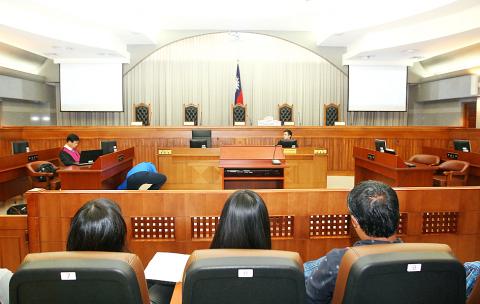Convicted Taipei MRT killer Cheng Chieh (鄭捷) yesterday said he hoped for the judicial process to end soon and that he deserved to be put to death for his crime, as his lawyers continued to put up a legal defense in Cheng’s appeal hearing at the Supreme Court in Taipei.
Citing the exceptional circumstances of the case and its impact on society, the Supreme Court decided — for the first time in the nation’s history — to hear the defendant and his lawyers’ defense in appealing the High Court’s death sentence ruling in October last year.
Cheng, then 21 years old, killed four people and injured 22 in a knife attack on the Taipei Mass Rapid Transit (MRT) System on May 21, 2014. The crime increased public fears of random attacks, and led to concerns about personal safety in public places, with ridership on the Taipei MRT system dropping for several weeks after the attack.

Photo: CNA
Reading from a prepared statement, Cheng said he wanted to apologize to the victims and their families.
“Maybe you will not forgive me, because if I were in your shoes, I probably would not forgive either,” he said. “However, maybe my apology can provide some consolation to you, therefore at this time I would like to apologize again.”
He then thanked the Supreme Court for allowing him to appear at the appeal hearing.
“At the start, I did not want to go through the litigation process. I just wanted to get on with it, to have the execution carried out as quickly as possible,” he said.
Cheng then said that his appeals were on the advice of his legal team.
“My lawyers and some people concerned about my life have put in a lot of effort, and they have also encouraged me. I felt all their endeavors should not go to waste, so I have been cooperating with lawyers through the judicial process, so the judges can listen to what the lawyers have to say,” he said.
Cheng concluded by saying: “I have done wrong and deserve to be punished. Maybe I will be executed in a few months’ time, but for inmates not on death row, what can they do?”
Cheng’s lawyers mounted their defense, with the aim of commuting the death sentence.
They said that when police detained and questioned Cheng, they did not inform him of his right to legal counsel, and cited other possible violations in due process of law.
Meanwhile, families of the victims accused the Supreme Court of “unfair treatment” as they were not notified to appear at yesterday’s hearing, saying that their voices had been silenced, but Cheng was given ample time to express his views.
Lee Jui-chang (李瑞昌), the brother of victim Lee Tsui-yun (李翠雲), expressed outrage at the “preferential treatment” Cheng received.
“When Cheng speaks in court, he does not show any remorse and displays the ‘I do not care’ attitude. Still, he could speak his mind today, but the judges did not want to hear from the victims’ families. We are very angry about this, it is very unfair,” Lee said.

CHAOS: Iranians took to the streets playing celebratory music after reports of Khamenei’s death on Saturday, while mourners also gathered in Tehran yesterday Iranian Supreme Leader Ayatollah Ali Khamenei was killed in a major attack on Iran launched by Israel and the US, throwing the future of the Islamic republic into doubt and raising the risk of regional instability. Iranian state television and the state-run IRNA news agency announced the 86-year-old’s death early yesterday. US President Donald Trump said it gave Iranians their “greatest chance” to “take back” their country. The announcements came after a joint US and Israeli aerial bombardment that targeted Iranian military and governmental sites. Trump said the “heavy and pinpoint bombing” would continue through the week or as long

TRUST: The KMT said it respected the US’ timing and considerations, and hoped it would continue to honor its commitments to helping Taiwan bolster its defenses and deterrence US President Donald Trump is delaying a multibillion-dollar arms sale to Taiwan to ensure his visit to Beijing is successful, a New York Times report said. The weapons sales package has stalled in the US Department of State, the report said, citing US officials it did not identify. The White House has told agencies not to push forward ahead of Trump’s meeting with Chinese President Xi Jinping (習近平), it said. The two last month held a phone call to discuss trade and geopolitical flashpoints ahead of the summit. Xi raised the Taiwan issue and urged the US to handle arms sales to

BIG SPENDERS: Foreign investors bought the most Taiwan equities since 2005, signaling confidence that an AI boom would continue to benefit chipmakers Taiwan Semiconductor Manufacturing Co’s (TSMC, 台積電) market capitalization swelled to US$2 trillion for the first time following a 4.25 percent rally in its American depositary receipts (ADR) overnight, putting the world’s biggest contract chipmaker sixth on the list of the world’s biggest companies by market capitalization, just behind Amazon.com Inc. The site CompaniesMarketcap.com ranked TSMC ahead of Saudi Aramco and Meta Platforms Inc. The Taiwanese company’s ADRs on Tuesday surged to US$385.75 on the New York Stock Exchange, as strong demand for artificial intelligence (AI) applications led to chip supply constraints and boost revenue growth to record-breaking levels. Each TSMC ADR represents

State-run CPC Corp, Taiwan (CPC, 台灣中油) yesterday said that it had confirmed on Saturday night with its liquefied natural gas (LNG) and crude oil suppliers that shipments are proceeding as scheduled and that domestic supplies remain unaffected. The CPC yesterday announced the gasoline and diesel prices will rise by NT$0.2 and NT$0.4 per liter, respectively, starting Monday, citing Middle East tensions and blizzards in the eastern United States. CPC also iterated it has been reducing the proportion of crude oil imports from the Middle East and diversifying its supply sources in the past few years in response to geopolitical risks, expanding